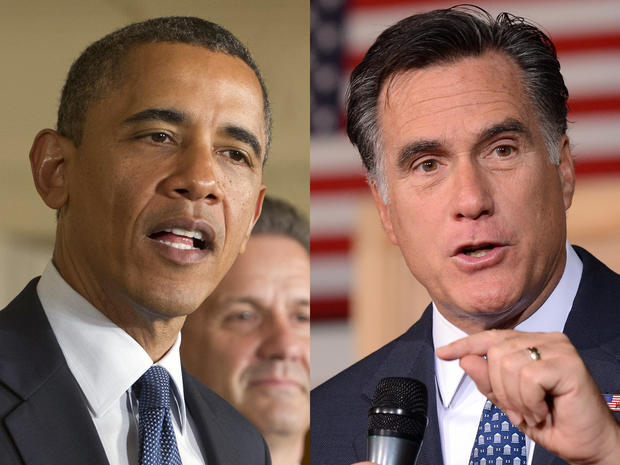Poll: Romney has slight edge over Obama
Updated: May 15, 12:45 p.m.
CBS News Poll analysis by the CBS News Polling Unit: Sarah Dutton, Jennifer De Pinto, Fred Backus and Anthony Salvanto.
(CBS News) Presumptive Republican presidential nominee Mitt Romney has a slight edge over President Obama in the race for the White House in the latest CBS News/New York Times poll.
According to the survey, conducted May 11-13, 46 percent of registered voters say they would vote for Romney, while 43 percent say they would opt for Mr. Obama. Romney's slight advantage remains within the poll's margin of error, which is plus or minus four percentage points.
Last month, a CBS News/New York Times poll showed Mr. Obama and Romney locked in a dead heat, with both earning 46 percent support among registered voters. Polls conducted in February and March showed Mr. Obama with an advantage over Romney, while a January poll showed Romney edging out Mr. Obama 47 percent to 45 percent. Another January poll showed the two tied.
Neither candidate, however, has had more than a six-point lead over the other since CBS News/New York Times began conducting head-to-head in polls this January.
Despite recent controversies surrounding issues like same-sex marriage, which Mr. Obama came out in support of last week, the poll indicates that the economy remains the most important issue to voters in the presidential election.
Poll: One in four less likely to back Obama over same-sex marriagePoll: Most Americans support same-sex unions
Full poll results (PDF)
Sixty-two percent of registered voters cited the economy as the most important issue in the presidential election. Concern over the budget deficit ranked a distant second at 11 percent, followed by health care at 9 percent. Seven percent picked same-sex marriage, 4 percent cited foreign policy and 2 percent chose immigration.
Most Americans (67 percent) believe the economy is in bad shape, but respondents expressed the most optimism on that issue since January 2008 - months before the economic crisis was in full swing. Thirty-two percent of Americans said the economy was in good shape, and 36 percent said they thought it was getting better. Twenty-four percent of Americans said they thought the economy was getting worse, and 39 percent said they thought it was staying the same.
Fifty percent of Americans said they approve of Mr. Obama's performance as president, while 48 percent disapproved. Except for the month following the death of Osama bin Laden, when Mr. Obama's approval rating ticked up to 57 percent, this matches highest his approval rating Mr. Obama has enjoyed in two years.
Romney now leads the president among independents, while Mr. Obama has an advantage among moderates. Independents opted for Romney 43 percent to Mr. Obama's 36 percent, whereas moderates supported Mr. Obama 50 percent to Romney's 39 percent.
Romney took the lead among women voters, who supported the former Massachusetts governor 46 percent to Mr. Obama's 44 percent, which is within the poll's margin of error. In April, Mr. Obama had an edge among women voters, with 49 percent support to Romney's 43 percent.
Both candidates continue to perform well with their political base. The president gets solid support from Democrats and liberals, while Romney is running strong with Republicans and conservatives.
Neither candidate has particularly strong favorability ratings, although Mr. Obama outperforms Romney in that arena: 45 percent of Americans each said they view the president favorably and unfavorably. Only 31 percent gave Romney a favorable rating, while 38 percent gave him a negative rating. Many voters continue to be undecided about Romney or haven't heard enough about him to have an opinion.
Obama team's attack on Romney mirrors 1994 race
Search the CBS News polls database
This poll was conducted by telephone on May 11-13, 2012 among 615 adults nationwide, including 562 registered voters, who were first interviewed for a CBS News/New York Times Poll conducted April 13-17, 2012. Phone numbers were dialed from samples of both standard land-line and cell phones. The error due to sampling for results based on the entire sample could be plus or minus four percentage points. The margin of error for the sample of registered voters is four percentage points. The error for subgroups is higher. This poll release conforms to the Standards of Disclosure of the National Council on Public Polls.

